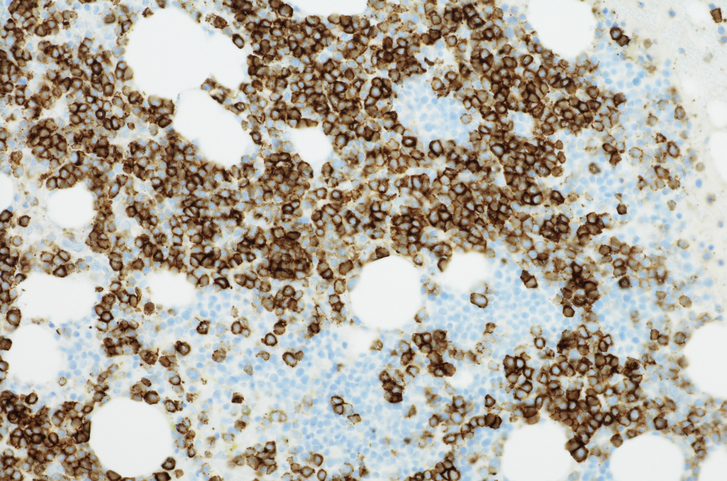A substantial, long-lasting response can be achieved in patients with relapsed/refractory multiple myeloma (RRMM) using equecabtagene autoleucel (equel-cel), according to a poster presented at the International Myeloma Society Annual Meeting 2023.
Researchers developed eque-cel, a fully human B-cell maturation antigen (BCMA) targeted chimeric antigen receptor (CAR) T-cell therapy, for use in patients with RRMM. This therapy was extensively investigated in a phase 1b/2 study called FUMANBA-1 (ClincialTrials.gov Identifier: NCT05066646). This study was a detailed assessment of the efficacy and safety of eque-cel conducted across 14 locations in China. It had a median follow-up period of 18.07 months (range, 0.4-30.3 months).
The FUMANBA-1 trial recruited 105 participants with RRMM who had received at least 3 prior lines of therapy, including at least 1 proteasome inhibitor and 1 immunomodulator. Selected participants were administered a single infusion of eque-cel at a dose of 1×106 cells/kg on 3 consecutive days of lymphodepletion with 500 mg/m2 cyclophosphamide and 30 mg/m2 fludarabine.
A total of 32.4% of the participants high-risk cytogenetic abnormalities, 13.3% had extramedullary disease, 11.4% received prior BCMA CAR T-cell therapy, and 52.4% had immunoglobulin G (IgG)-type MM.
Among the 105 patients included in the study, 103 could be evaluated for treatment efficacy; 96.1% achieved a response, with 77.7% achieving a complete response (CR) or a stringent complete response (sCR). The 12-month progression-free survival (PFS) rate was 80.0% (95% CI, 70.33, 86.76).
The research team reported that the following groups of patients achieved deeper responses: those without prior CAR T-cell therapy (sCR/CR rate, 82.4%), patients who already had 3 lines of treatment (sCR/CR rate, 96.3%), and those who did not have IgG MM (sCR/CR rate, 91.8%).
Additionally, better 12-month PFS rates were seen in patients without high-risk cytogenetic abnormalities (92.0%; 95% CI, 80.07, 96.92) and those without prior CAR-T therapy (85.5%; 95% CI, 75.75, 91.51).
A total of 97 individuals (94.2%) achieved minimal residual disease (MRD)-negativity, including all patients who achieved a complete response. A total of 90% of individuals who achieved a complete response were persistently MRD-negative for 12 months or more. cytokine release syndrome occurred in 93.3% of patients, with only 1 being grade 3 or higher.
“A profound and durable response can be achieved in RRMM patients treated with eque-cel with a median follow-up of 18.07 months,” the study authors concluded in their poster.
Reference
Li C, Wang D, Fang B, et al. P-290: Updated long-term follow-up results of a phase 1b/2 study (FUMANBA-1) in patients with relapsed/refractory multiple myeloma (RRMM) treated with Equecabtagene Autoleucel. Presented at IMS 2023. September 27-30, 2023. Abstract P-290.
This article originally appeared on Hematology Advisor
